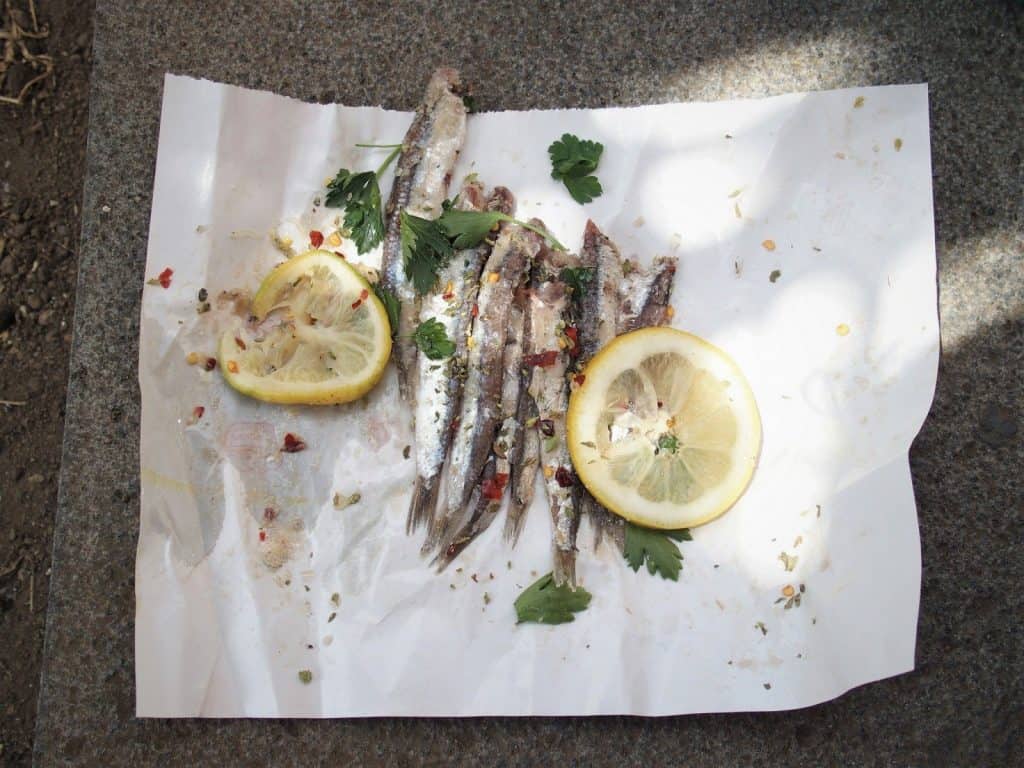The whiff in the air gives it away before I see it. When I find the steps down to the Catania Fish Market market on the Italian island of Sicily, it is almost noon. In the upper part, next to the Piazza del Duomo, the fishmongers are already starting to pack up. I catch only glimpses of mussels, ricci, shells, and fish in all shapes and forms. As the trattorie along the streets get more and more crowded, I wander from fish to meat to fruit to vegetable stalls and back, on the lookout for a cheap and easy lunch, when an old bloke catches my eye.
Note: For more foodie travel inspiration, click here and browse the wide selection of culinary tours in Catania and Sicily, Italy, on Get Your Guide.
He has only a small stall selling seafood. His face is dark and leathery. He looks like he had been on the sea before the sun went up, catching all the treasures he is now selling.
One corner of his table is dedicated to what looks like a snack. Tiny fish — sardines, anchovies, sprat, I never understand the difference — are laid out on a sheet of wax paper, about ten on each. They are covered with coarse salt and pepper and garnished with parsley and a slice of lemon. And there is a handwritten sign saying “1 €”.
I stop.
The old guy, who had been chatting with his neighbors, looks at me and grins.
I have a camera slung over my shoulder, which too obviously identifies me as a tourist.
“Che cos’é? Posso mangiare?” I blurt out in my best Italian. “What is this? Can I eat it?”
He nods and smiles, “Good!”, and demonstrates how to prepare the fish: he takes the slice of lemon and rubs off the salt and scales.
I am skeptical. “Posso mangiare tutto?!?” – “Can I eat all of this?”
He takes the fish, shoves it whole into his mouth and proceeds to prepare another one for me.
This time I am brave and follow his example.
He grins and nods.
I grin and nod.
Usually, I have a massive panic about choking on fish bones. But after I chew it once, twice the fish slides down my throat quite smoothly. There is a bit of crunch, slight fishiness, covered by salt and rounded off by the lemon. I am sold and give the old man his euro.
I find a spot in a small, quiet piazza away from the market, and settle down for lunch. From the residencia, my accommodation up in Taormina, I have brought two hard-boiled eggs, two oranges and two untoasted slices of toast with butter and salami. I spread my picnic out on a bench, together with the small package of fish. Even in the shade of the trees, the sun is scorching hot.
I am enjoying myself — taking bites of the bread, peeling my eggs and oranges, and in between downing a fish like I was a seal. The fish is salty, so I wash it down with sips from my water bottle. I watch the restaurant at the corner. It is off the tourist track. The waiter standing outside is having a hard time convincing people to come inside for lunch. There are not many people to convince.
I finish the eggs, the bread, the oranges, the water. And am still left with five fish.
The lemon slice has long disintegrated.
I don’t want to toss any of the fish because I don’t like throwing food away. And because the fish is actually quite delicious.
Just very salty.
The orange peels take the position of the lemon slice in scrubbing off the fish scales and — more importantly — the salt.
It takes another ten minutes, but I finish the last of the fish. What is left of the orange peel has to serve as soap to wash the fishy smell of my fingers.
Suddenly the waiter comes towards me. I am about to gesture that I will, of course, clean up after myself, when he points at my water bottle. “Acqua?”
I nod and give him the bottle. He disappears into the air-conditioned restaurant and reappears a moment later. He hands me my bottle of water, complete with fat ice cubes, and two packages of moist paper towels. They smell like lemon.

